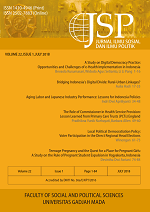Global Research Trends and Regional Disparities in the Political Participation of Arab Muslim Migrants: A Bibliometric Analysis (2013–2023)
Danial Darwis(1*)
(1) Islamic Politics – Political Science, Muhammadiyah University of Yogyakarta (UMY), Indonesia; Faculty of Social and Political Sciences, Cenderawasih University, Jayapura-Indonesia
(*) Corresponding Author
Abstract
This bibliometric analysis of Scopus-indexed literature (2013–2023) investigates global research trends and regional disparities in the political participation of Arab Muslim migrants. By analysing 12 studies selected from 30 initial search results, the study identifies dominant themes such as diaspora, religiosity, and activism that reflect the socio-political dynamics of Arab Muslim migrants in host countries. These findings highlight the intersections between migration, identity, and politics, influencing policy and integration processes. However, notable regional disparities exist, with 75% of studies originating from the United States and Western Europe, while contributions from the Middle East and North Africa remain minimal. This imbalance limits perspectives and highlights underrepresentation. The research gaps also include insufficient exploration of how European policies affect integration and limited empirical studies addressing political participation strategies in non-Western contexts. This study emphasises the significance of political participation in fostering multicultural policy development and integration. The bibliometric methodology employed, including the use of VOSviewer for keyword co-occurrence analysis, provides quantitative insights into research patterns and thematic clusters, ensuring a rigorous evaluation of trends and gaps. Practical implications include the need for interdisciplinary and regionally inclusive approaches to address systemic barriers and enhance participation. Policymakers and researchers are encouraged to prioritise underrepresented themes and regions, facilitating more inclusive and comprehensive migration studies.
Keywords
Full Text:
PDFReferences
Abdelhadi, E. (2017). Religiosity and Muslim Women’s Employment in the United States. Socius, 3. https://doi.org/10.1177/2378023117729969
Abdelhadi, E. (2019). The Hijab and Muslim women’s employment in the United States. In Research in Social Stratification and Mobility (Vol. 61). https://doi.org/10.1016/j.rssm.2019.01.006
Abdelhadi, E., & England, P. (2019). Do values explain the low employment levels of Muslim women around the world? A within-and between-country analysis. British Journal of Sociology, 70(4), 1510–1538. https://doi.org/10.1111/1468-4446.12486
Abdillah, A. (2023). Analisis Bibliometrik Perubahan Perilaku Politik, Menggunakan Vosviwer. Journal of Society Bridge, 1 (September), 74–82. https://doi.org/10.59012/jsb.v1i3.24
Alrmizan, M. (2022). The Arabs and the Muslims. Diaspora Studies, 6(1), 1–19. https://doi.org/10.1163/09763457-Tat00001
Ayoub, P. M., & Bauman, L. (2019). Migration and queer mobilisations: how migration facilitates cross-border LGBTQ activism. Journal of Ethnic and Migration Studies, 45(15), 2758–2778. https://doi.org/10.1080/1369183X.2018.1497955
Balogun, J. A. (2023). Health Research in Nigeria: A Bibliometric Analysis. Health Research in Nigeria: A Bibliometric Analysis, 1–184. https://doi.org/10.1007/978-981-19-7097-9
Beek, M., & Fleischmann, F. (2019). Religion and integration: does immigrant generation matter? The case of Moroccan and Turkish immigrants in the Netherlands. Journal of Ethnic and Migration Studies, 46(17), 3655–3676. https://doi.org/10.1080/1369183X.2019.1620417
Benstead, L. J., Jamal, A. A., & Lust, E. (2015). Is it gender, religiosity or both? A role congruity theory of candidate electability in transitional Tunisia. Perspec tives on Politics, 13(1), 74–94. https://doi.org/10.1017/S1537592714003144
Castles, S., De Haas, H., & Miller, M. J. (2014). The Age of Migration: International Population Movements in the Modern World (5th ed.). Palgrave Macmillan.
Czaika, M., & De Haas, H. (2013). T he Effectiveness of Immigration Policies. Population and Development Review, 39(3), 487–508. https://doi.org/10.1111/j.1728-4457.2013.00613.x
Donthu, N., Kumar, S., Mukherjee, D., Pandey, N., & Lim, W. M. (2021). How to conduct a bibliometric analysis: An overview and guidelines. Journal of Business Research, 133, 285–296. https://doi.org/10.1016/j.jbusres.2021.04.070
Fiandari, Y. R. (2022). Analisis Bibliometrik Publikasi Perkembangan Penelitian Pemasaran Digital Kosmetik Halal. Baca: Jurnal Dokumentasi Dan Informasi, 43(2), 95. https://doi.org/10.14203/j.baca.v43i2.843
Glas, S. (2021). How Muslims’ denomination shapes their integration: the effects of religious marginalization in origin countries on Muslim migrants’ national identifications and support for gender equality. Ethnic and Racial Studies, 44(16), 83–105. https://doi.org/10.1080/01419870.2021.1883082
Khatimah, H. (2019). Sejarah imigrasi masyarakat Jazirah Arab di kabupaten Dompu. Jurnal Ilmiah Ilmu Pendidikan ( JIIP), 2(1), 220–227. https://doi.org/https://jiip.stkipyapisdompu.ac.id/jiip/index.php/JIIP/article/view/46
Koser, K. (2016). International Migration: A Very Short Introduction. Oxford University Press. https://doi.org/10.1093/actrade/9780198753773.001.0001
Malakhov, V. (2019). Why tajiks are (Not) like Arabs: Central Asian migration into Russia against the background of Maghreb migration into France. Nationalities Papers, 47(2), 310–324. https://doi.org/10.1017/nps.2018.35
Maritato, C. (2022). Turkey As the ‘Liberator’ of Muslims in Europe: the Circulation of Islamophobia As a Political Remittance. Partecipazione e Conflitto, 15(2), 444–465. https://doi.org/10.1285/i20356609v15i2p444
Mukherjee, D., Lim, W. M., Kumar, S., & Donthu, N. (2022). Guidelines for advancing theory and practice through bibliometric research. Journal of Business Research, 148, 101–115. https://doi.org/10.1016/j.jbusres.2022.04.042
Peucker, M., & Ceylan, R. (2017). Muslim community organizations-sites of active citizenship or self-segregation? Ethnic and Racial Studies, 40(14), 2405–2425. https://doi.org/10.1080/01419870.2016.1247975
Rahman, H. (2023). Analisis Bibliometrik Perkembangan Penelitian Inovasi Kebijakan di Indonesia. Matra Pembaruan, 7(1), 37–48. https://doi.org/10.21787/mp.7.1.2023.37-48
Rousseau, R., Egghe, L., & Guns, R. (2018). Becoming Metric-Wise: A Bibliometric Guide for Researchers. In Becoming Metric- Wise: A Bibliometric Guide for Researchers (Vol. 01). https://doi.org/10.1016/C2017-0-01828-1
Schain, M. A. (2018). Shifting tides: Radical-Right Populism and immigration Policy in Europe and the United States. Migration Policy Institute, 1–38.
Spierings, N. (2015). Gender Equality Attitudes among Turks in Western Europe and Turkey: The Interrelated Impact of Migration and Parents’ Attitudes. Journal of Ethnic and Migration Studies, 41(5), 749–771. https://doi.org/10.1080/1369183X.2014.948394
Tilly, C. (2004). Social Movements, 1768-2004. In Paradigm Publishers. Paradigm Publisher.
van Eck, N. J., & Waltman, L. (2013). {VOSviewer} manual. Leiden: Univeristeit Leiden, March, 1–29 htt p://www.vosviewer.com/documentation/Manual_ VOSviewer_1.6.1.pdf
Article Metrics
Refbacks
- There are currently no refbacks.
Copyright (c) 2025 Jurnal Ilmu Sosial dan Ilmu Politik

This work is licensed under a Creative Commons Attribution-ShareAlike 4.0 International License.























